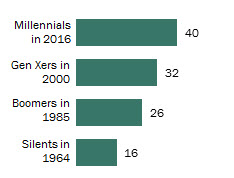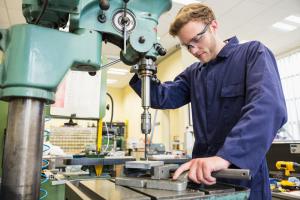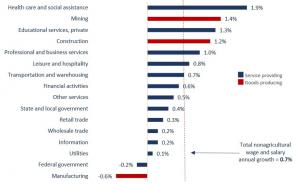How Manufacturing Companies Get Younger Generations Interested in Manufacturing Careers

Percentage of employed 25-29 year olds with a bachelor's degree or more
Manufacturing jobs are projected to decline by 6%, while the skills gap is growing every day. How do we get younger generations involved? Read more!
Manufacturing Careers are in the State of Flux
It’s a changing world.
At a time when we’re trying to encourage manufacturing here at home, the underlying fundamentals of the manufacturing industry have been changing rapidly.
Production productivity has gone through the roof, thanks to revolutionary advances in automation. In other words, today’s manufacturing industry can now produce more with fewer employees.
Yet even with the lower number of workers, manufacturers are having trouble finding enough skilled labor to fill the remaining positions. Why? Today’s high-tech manufacturing careers require job candidates with higher levels of education and technical skills than ever before, which narrows the applicant pool significantly. This recruiting issue is further compounded by the huge number of Baby Boomers who are retiring every year.
Unfortunately, this combination of investment in automation and shortage of available workers is dragging down manufacturing job growth projections. The U.S. Census estimates that manufacturing jobs will actually decline slightly between 2016 and 2020 relative to other fields of employment, as shown in their chart above.
To Encourage Young People to Pursue Manufacturing Careers, We First Need to do Some Market Research
Why can’t managers find enough qualified candidates from the younger generations to fill the available jobs in manufacturing careers?
The answer seems to be that younger generations are by and large less interested in working in manufacturing compared to other fields.
But why?
Let’s look at a little market research on the demographics, attitudes, and assumptions about work held by the Millennials and younger generations:
The chart shows the percentage of employed 25 to 29-years-olds with a bachelor’s degree or more. Four-in-ten Millennial workers ages 25 to 29 had at least a bachelor’s degree in 2016, according to a Pew Research Center analysis of Current Population Survey data. Source: Pew Research Center analysis of 1964, 1985, 2000, and 2016 Current Population Survey Annual Social and Economic Supplements (IPUMS).
Advantages of Younger Workers in Pursuit of Manufacturing Careers
1. Millennials and younger generations are the most educated generations to date.
The chart shows the percentage of employed 25 to 29-year-olds with a bachelor’s degree or more. Four-in-ten Millennial workers aged 25 to 29 had at least a bachelor’s degree in 2016, according to a Pew Research Center analysis of Current Population Survey data. Source: Pew Research Center analysis of 1964, 1985, 2000, and 2016 Current Population Survey Annual Social and Economic Supplements (IPUMS).
2. As Digital Natives, they would be more naturally adept at working with computers and modern visualization systems (and the associated with automation and artificial intelligence tools) as compared to workers from older generations.
3. Millennials helped create and lead the Maker Movement and its related components, ranging from 3D Printers to Etsy, to Maker Faires and Makerspaces.
Disadvantages when Recruiting Younger Workers into Manufacturing Careers
1. Millennials report that they value fulfillment in their careers over more traditional rewards, such as making lots of money. (Manufacturing jobs can be among the highest paid, but this alone appears to be a less important inducement.)
2. Census figures indicate that Millennials and younger generations are also less mobile in the workplace economy than previous generations of workers at their age. Thus, they are less likely to move away from home to a new area to pursue a career.
3. Finally, the biggest problem: Millennials view manufacturing careers in a negative light. They consider manufacturing (and the related construction field) to be an unattractive, dirty field to work in that offers a less rewarding future than other fields.
How to Build a Marketing Campaign to Promote Manufacturing Careers
For those working in the manufacturing sector (include ourselves here at Formaspace), we see the world quite differently. Manufacturing is an exciting field that’s on the cusp of major, even radical, changes brought about by the digital revolution.
What to do? Many in the manufacturing industry feel that a marketing campaign is the obvious answer.
So we’ll put our marketing cap on for second and create a classic sales funnel to drive prospects through our marketing campaign.
Let’s get started.
For this sales funnel, we want to convince young people to pursue a career in manufacturing.
At the wide end of our sales funnel are prospects that we want to attract by generating awareness and interest. Among those who show interest, we want to follow up by providing knowledge that encourages liking. Next, we want work with those who show signs of liking and encourage them to have a preference and make a commitment to careers in manufacturing.
Generating Awareness and Interest: Leverage the Maker Movement to Get the Message Across that Manufacturing is Cool
Looking at the research in the previous section, it’s clear that while many Millennials and younger generations declare they have no interest in manufacturing (as they understand it), they are, in fact, interested in some of the very things that go along with being a manufacturer, including creative product design, advanced visualization, 3D printing, CNC programming, IoT and app development, and more – except they call it by a different term: being a Maker.
So it follows that for the first step of our marketing sales campaign, we would want to use the existing positive feelings about being a Maker to find prospects that we can attract and interest into learning more about the manufacturing field.
In fact, it might be better to stop using the word manufacturing altogether...
Read more ... https://formaspace.com/articles/manufacturing/get-younger-generations-interested-in-manufacturing-careers/?utm_source=einpresswire&utm_medium=content&utm_campaign=article-121917
Kelsea Marshall
Formaspace
8002511505
email us here
Legal Disclaimer:
EIN Presswire provides this news content "as is" without warranty of any kind. We do not accept any responsibility or liability for the accuracy, content, images, videos, licenses, completeness, legality, or reliability of the information contained in this article. If you have any complaints or copyright issues related to this article, kindly contact the author above.



